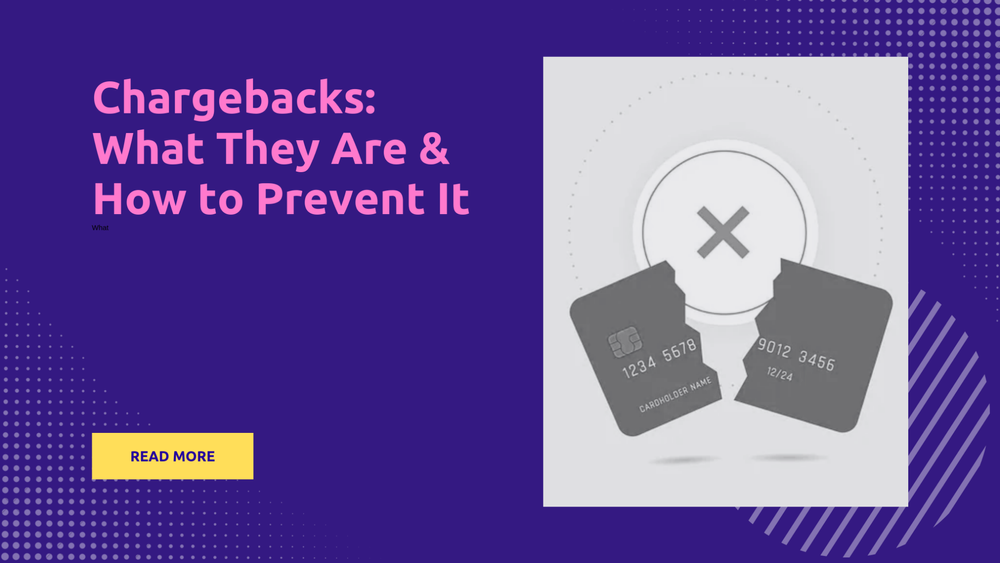Clickfunnels vs Shopify: Which Tool Works Best for Your Business in 2024?
By Admin on
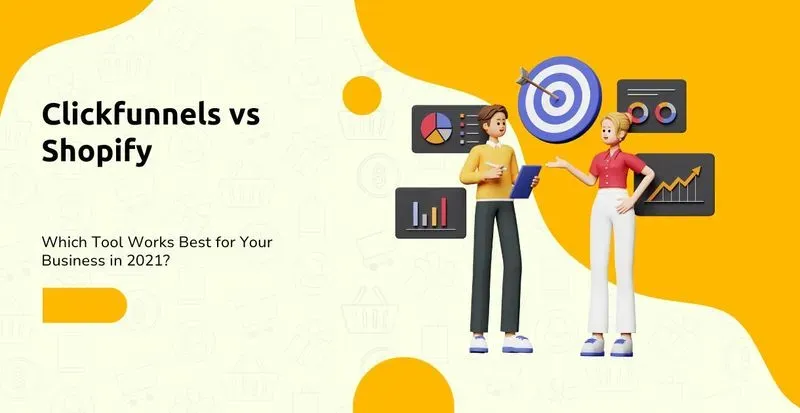
The decision to start an online business, selling either a single or multiple products on the internet, is a significant step. However, the challenge often arises when it’s time to choose the right platform to sell those products. To help with this decision, here’s a comparison between two leading tools — Clickfunnels and Shopify. The comparison aims to determine which platform best suits your business needs.
For those who are exploring how to start an online store, Shopify and Clickfunnels are names that likely keep coming up. With the multitude of dropshipping and ecommerce guides available, it can be overwhelming to choose the right ecommerce platform for selling products.
The insights provided in this ClickFunnels vs Shopify comparison article aim to clarify which ecommerce platform is ideal for running an online business. However, it’s crucial to note that neither tool is perfect on its own. Each comes with its strengths and weaknesses. The choice of platform will ultimately depend on the nature of the business being started and the types of products being sold.
Main Differences Between Clickfunnels vs Shopify
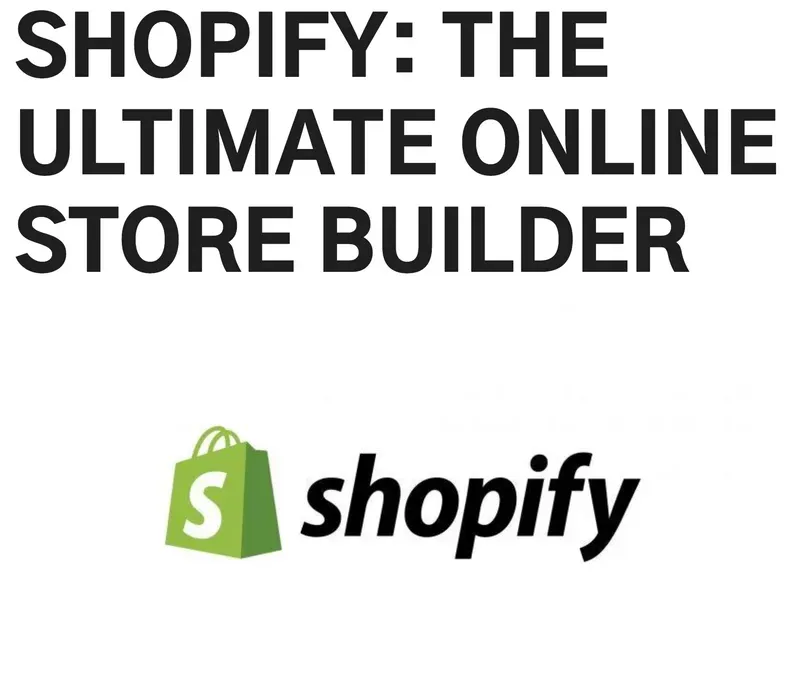
The primary distinctions between Clickfunnels and Shopify lie in:
- The availability of two plan options in Clickfunnels, with the basic plan being pricier, compared to Shopify’s three different plans.
- The absence of a mobile app for Clickfunnels, while Shopify provides an app compatible with both Android and iPhone devices.
- Clickfunnels excelling in offering ready-made sales funnels, in contrast to Shopify, which is more efficient in facilitating inventory and customer management.
An overview of both services reveals the following:
Shopify: The Ultimate Online Store Builder
For those considering the launch of a comprehensive online store featuring a wide range of products, Shopify stands out as a prime option. It offers an array of themes for website construction, an inventory management system for handling physical products, payment integration, and exclusive shipping rates from major carriers like DHL, UPS, and USPS.
Essentially, it provides all the necessary tools to establish and operate an online store smoothly, eliminating the need for any coding. Furthermore, the robust developer community around Shopify ensures quick and effective solutions to both technical and non-technical challenges, accessible through a simple internet search. Moreover, the platform boasts an expanding App Store, which offers a variety of plugins and integrations to further augment the functionality of a Shopify website.
Clickfunnels: The All-In-One Sales Funnel Software

Clickfunnels is highly recommended for individuals seeking to market or sell a product for the first time. This software stands out due to its pre-built sales funnels, which have been proven to increase conversions. There are specific sales funnels designed for a variety of purposes, including selling products, memberships, courses, ebooks, webinars, and even services.
Furthermore, Clickfunnels offers users the ability to create an online store for their products and services. Additionally, it provides tools to build an email list and execute automated email marketing campaigns.
While the online stores created with Clickfunnels might not have as many features as those designed with Shopify, they offer a solid starting point. With Clickfunnels, the need for other marketing software is eliminated, streamlining the process for users.
Clickfunnels Vs Shopify: Features Comparison
From the overview provided, one might get the impression that these tools cater to two dramatically different audiences, which is indeed the case.
Shopify Feature Rundown
Shopify is designed for seasoned entrepreneurs proficient in utilizing marketing software, crafting sales funnels, and converting visitors into customers, offering a comprehensive platform for creating and managing online stores.
Among its top features are:
- Online Store Builder: With a vast array of themes, both free and paid, Shopify enables the customization of online stores. Users can effortlessly tailor each element of their store’s theme, including text, colors, and images through a drag-and-drop interface, and even dive into custom CSS and HTML for more advanced personalization. Shopify also supports blogging via its content management system and ensures that all websites are mobile responsive, allowing customers to shop conveniently from any device.
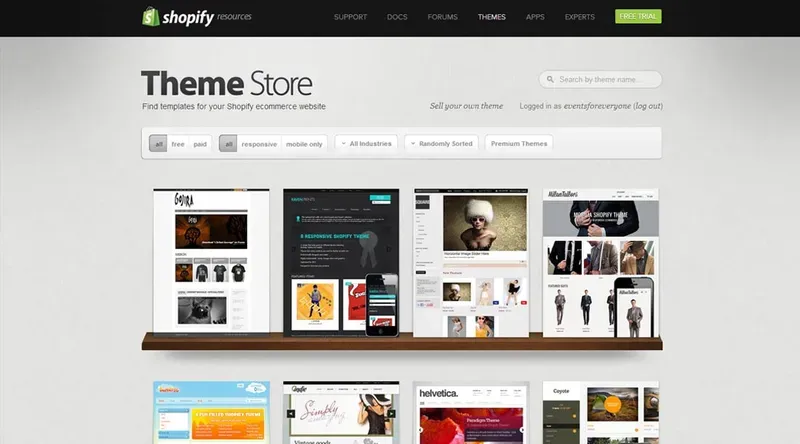
- Inventory Management System: Shopify simplifies inventory management, enabling users to add new products, create variants, upload images, and specify stock levels. The platform automatically updates inventory levels as sales occur, alerting users when it’s time to restock. Additionally, Shopify offers the flexibility to sell products even when they are being restocked.
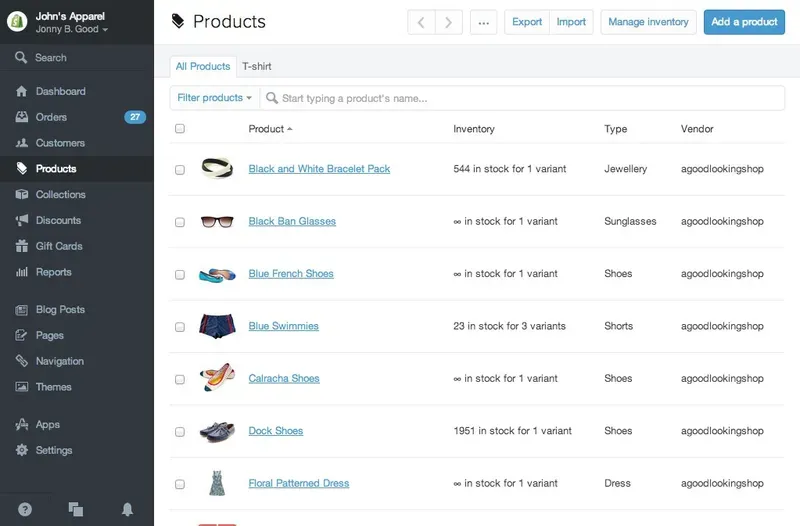
- Analytics Dashboard: Users gain access to insightful analytics, including traffic, orders, and sales data. Integration with Google Analytics offers deeper insights into customer behavior, sources of traffic, and product performance, enabling informed decisions about inventory management.
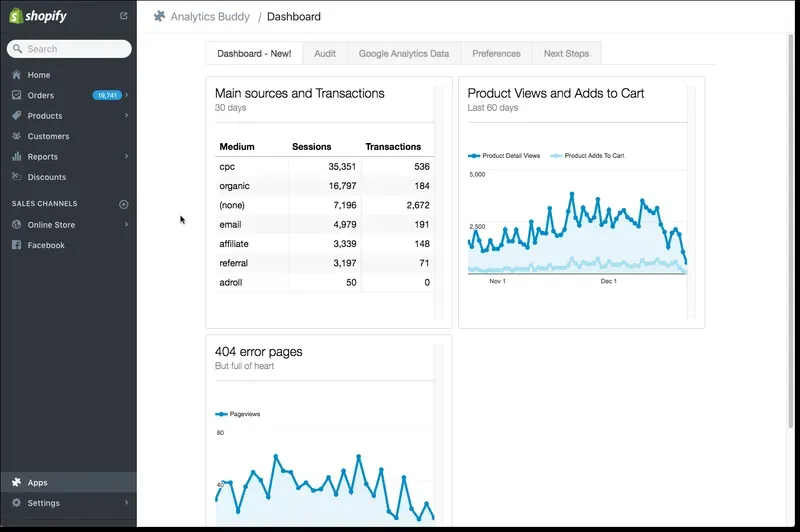
- Customer Management System: Shopify provides detailed insights into customers’ shopping habits and history. It supports the creation of membership sites, marketing emails, and facilitates customer segmentation. Users can also manage refunds directly through the platform.
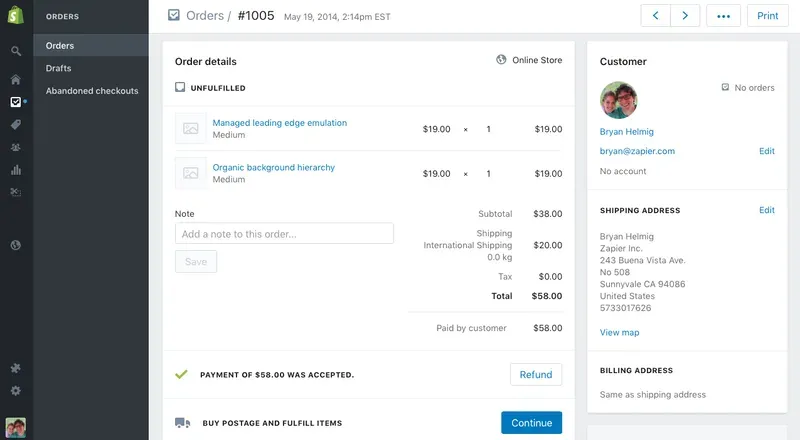
Sales Channels: Shopify extends its reach to social media networks like Facebook and Pinterest, marketplaces such as Amazon and eBay, and can integrate with physical stores, offering a unified shopping experience across various channels.
App Store: The platform’s app store hosts an extensive collection of plugins and integrations to enhance website functionality, supporting a wide range of activities from landing page creation to email marketing.
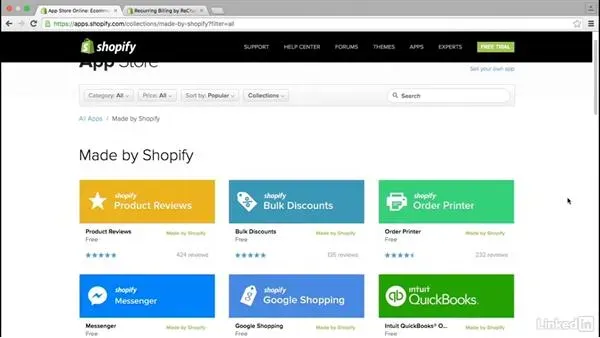
Payment Integration: Shopify supports a wide array of payment options including major credit cards and over 50 online payment gateways like PayPal. It also automates the calculation of local taxes and offers shipping incentives.
Shipping and Delivery: Through partnerships with DHL, USPS, and UPS, Shopify provides competitive shipping rates. Collaboration with Oberlo allows for efficient dropshipping, enabling users to sell products without maintaining inventory.
Mobile App: Available for both Android and iPhone, the Shopify mobile app facilitates on-the-go management of sales, orders, inventory, and customer communication.
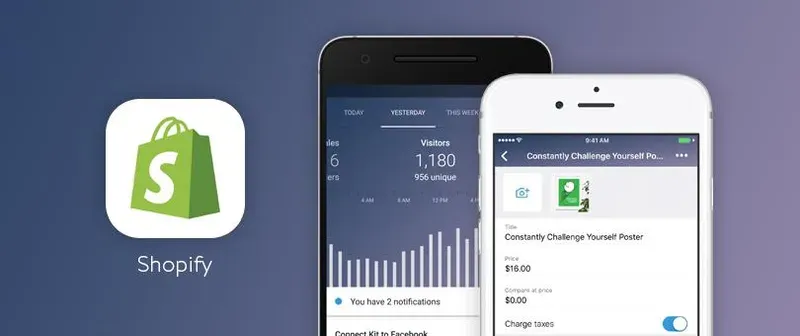
Clickfunnels Feature Rundown
Clickfunnels is designed for beginners and non-experts aspiring to venture into online business. It offers a comprehensive and user-friendly tool that aids in setting up not just an online store but the entire marketing funnel.
Clickfunnels provides a variety of robust tools:
- Ready-made Sales Funnels: Clickfunnels offers pre-designed sales funnels, encompassing complete sets of web pages leading customers towards a purchase. These funnels cater to a range of products including physical items, digital products, courses, ebooks, memberships, subscriptions, webinars, and more. Templates for sales pages, opt-in pages, thank you pages, and checkout pages are also available, allowing users to simply insert their content and images to get started.
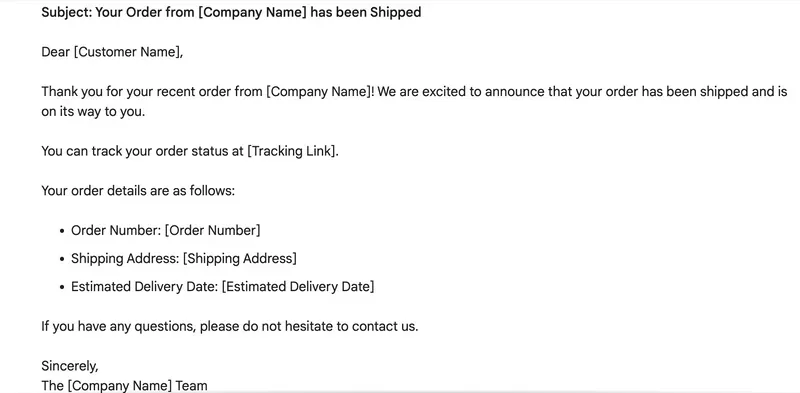
Website Building Tool: Users have the flexibility to build their sales funnels from scratch using the website building tool, which supports text, images, checkout carts, payment integration, opt-in forms, and more, to create any type of web page required for a sales funnel.
Payment Integrations: Clickfunnels facilitates direct collection of payments on sales pages by integrating with various payment processors such as Paypal and Stripe.
Affiliate Marketing System: A standout feature of Clickfunnels is its ability to create personalized affiliate programs for products and services, enabling users to have a dedicated team of salespeople through an incentivized commission system.
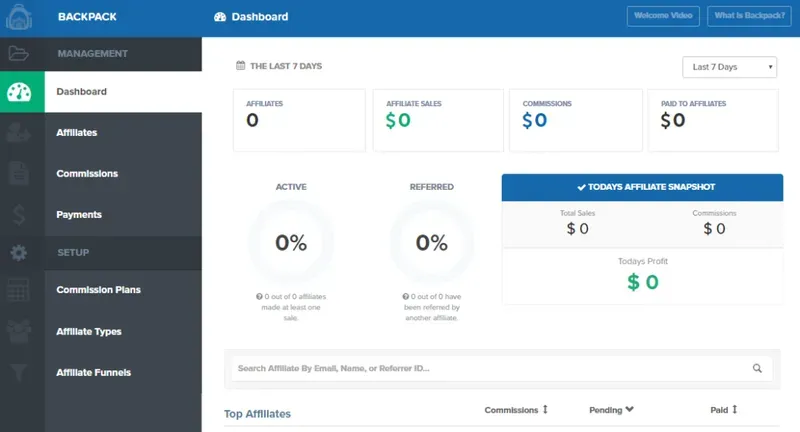
- CRM System: Clickfunnels includes a comprehensive CRM system that provides detailed information about customers, including location, email and social profiles, purchase history, and more. It also allows for customers to be segmented based on various criteria for targeted email marketing campaigns.

- Email Marketing Tool: The platform enables the creation of extensive email marketing campaigns, with features to design emails, sequence them, and automate the distribution process, ensuring that subscribers receive emails as soon as they sign up.
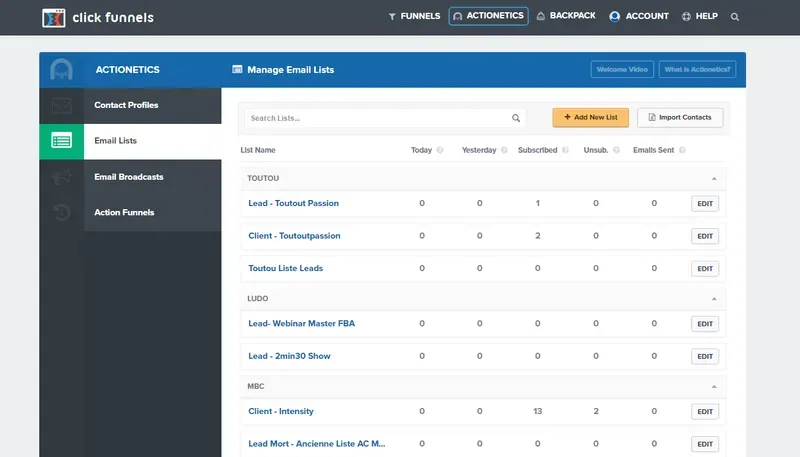
- Action Funnels: This automation tool integrates sales funnels with email campaigns for streamlined marketing automation. It allows users to specify the list additions for users based on their interactions, such as opting in or purchasing, and automate subsequent email campaigns based on various triggers.
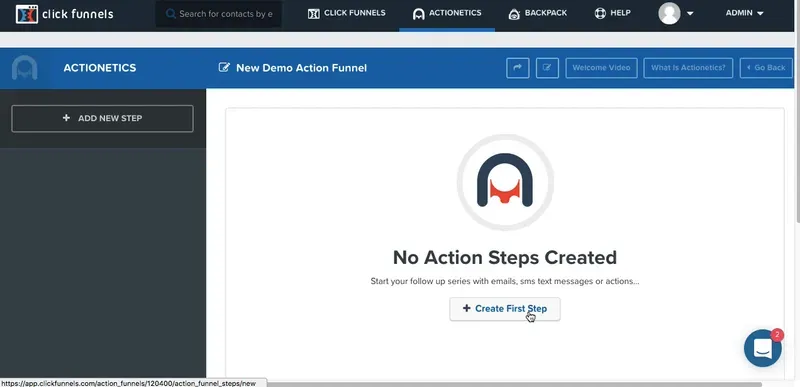
Builderall Pricing
ClickFunnels vs Shopify: Pros and Cons
Here are the top three advantages and disadvantages of Shopify and Clickfunnels, based on their features.
Shopify Pros
- Shopify is recognized for its robust platform that enables the creation of online stores to sell of a wide range of products, benefiting from an efficient inventory management system.
- Users benefit from significantly reduced shipping rates through partnerships with delivery companies including DHL, USPS, and UPS.
- A mobile app is available, facilitating the management of an online store remotely.
Shopify Cons
- Shopify serves merely as a platform for selling products, requiring individuals to acquire marketing skills to drive sales to their websites.
- Integration with additional services, such as email marketing, landing page development, and affiliate program creation, is necessary, which may increase costs.
- Setting up a store, designing sales funnels, and implementing them effectively demands considerable time and technical marketing expertise.
Clickfunnels Pros
- Individuals can sell products without any marketing knowledge, thanks to prebuilt funnels designed for maximum conversions.
- Access to a CRM system, email marketing tool, and automation tool is included, eliminating the need for additional services.
- The process of building a funnel and selling a product can be completed in just a few hours.

Clickfunnels Cons
- The subscription comes at a higher cost.
- It’s not the best option for managing a large inventory or operating a comprehensive online store.
- There is a lack of a mobile application for usage while on the move.
Verdict
From this ClickFunnels vs Shopify comparison article is quite evident that Shopify is recognized as an excellent option for individuals skilled in marketing who are looking to dedicate themselves fully to managing and running their online store. Its capabilities in product management and delivery are unparalleled. However, it requires proficiency in setting up various integrations necessary for building landing pages, conducting email campaigns, and automating the online business.
For those who are new to selling products online, Clickfunnels emerges as the superior choice. It is designed to be user-friendly, eliminating the need for extensive marketing knowledge to construct sales funnels. With Clickfunnels, users receive comprehensive services essential for launching and operating their online business, including web hosting to facilitate a smooth start.
Frequently Asked Questions
Can You Utilize Clickfunnels for Dropshipping?
Indeed, Clickfunnels facilitates the creation of landing pages for a dropshipping venture and allows integration with third-party shipping applications.
Is Shopify Secure and Legitimate?
Another way to look at this is, “Is Shopify trustworthy?” The answer is YES. Shopify is a reputable company known for its excellent customer service.
Is Making Money with Shopify a Feasibility?
Absolutely, yet it’s crucial to have an effective marketing strategy in place. Additionally, it’s advisable to integrate Shopify with marketplaces like Etsy or Amazon to access a broader audience.

